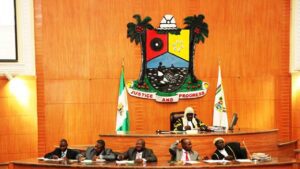


High cost of government, low outcome
By Dakuku Peterside
President Bola Ahmed Tinubu has taken both symbolic and structural actions to demonstrate his belief that the current high cost of government is not sustainable. The first was an announcement or executive order directing Ministries,Departments and Agencies(MDAs)to slash the size of official delegations for foreign and domestic trips by up to 60 per cent – an action that resonated with the mood in the country. The second is the Federal Executive Council’s approval to implement Steve Oronsaye’s report on the merger and scrapping of MDAs. This structural action is a baby step, albeit good for proponents of a complete overhaul of government structure . Both measures are more symbolic than substantive. However, it clearly shows that the government realises the negative impact of high government costs on economic growth and providing services to the people.I acknowledge as a fact that a US type presidential system tends to be big by constitutional requirement. And in a country where the government is both an industry and a social welfare institution, the tendency for big expansive government is high.
Beyond the symbolic actions, which have their values, is the need for substantive actions and a complete attitudinal change towards waste and profligacy in government.
We have had enough debate on the unwieldy and inefficient size and structure of government, our leaders have enough ideas and justifications to prune down the size of government. The only ingredient left to make that happen is the political will. I can imagine the government is caught between a public opinion pressure to cut costs and a constitutional imperative to assemble a huge choir.
On attitude, most government officials have yet to come to terms with the reality of our economic downturn and the need to be more disciplined, prudent and productive .The signals from high officials of government are both depressing and insensitive. For these reasons, we are focusing today on those little acts of prudence that we do every day and, over time, will make a substantial difference.
Political officeholders must have an attitude change in ostentatious living and craving for opulence and status within the society. It is obvious to all that the pomp and festival of political office attracts a mob of political hangers on whose presence bloats government costs. Trimming that is a matter of personal choice and strength of character.
In our clime, politics and wealth are almost synonymous; politicians compete and outcompete wealthy people in a show of wealth and power. The blaring of sirens and long motorcades of expensive and luxury SUVs conveying our political office holders in federal, state, and LGA is almost becoming a public nuisance and separating them from the people they should serve. Cutting down on this lifestyle is long overdue. This attitude flies in the face of our current reality, where many suffer and struggle for the basics. Frank Herbert, American Writer, argues, “Good governance never depends upon laws but the personal qualities of those who govern. Government machinery is always subordinate to the will of those who administer that machinery.”
We expect attitudinal change among political officeholders on abuse of official property, including official vehicles assigned to them. Many use this as personal property and sometimes even allow family members and friends to damage these properties. We must also jettison the culture of assigning many security attachés to VIP and political office holders. We know the security situation in the country is dire but wasting the existing security personnel and apparatus on a few political officeholders when many Nigerians need these security officers to work to secure their lives and properties is deplorable. Just as political officeholders’ lives matter, so do the lives of ordinary Nigerians.
It is disheartening that some of the political officeholders are still in a permanent political campaign mood, not knowing it is time to govern. They spend ten times the cost of a single project on project flag off or commissioning.
Corruption is still pervasive, and mismanagement of public funds exacerbates the high cost of government. Funds allocated for public projects and services are diverted, budgets are padded, and fiscal prudence is thrown to the dogs. The level of corruption among public officials is still alarming and must be challenged and exposed, and perpetrators made to account to the law for their dastardly acts.
Some structural changes and constitutional amendments are needed to cut down on the cost of governance in Nigeria. Cutting down on our bloated bureaucracy is essential to save costs. This is the aim of implementing the Oronsaye report. The government should reduce the number of political appointees and close inefficient public enterprises that incur losses that the government eventually covers. We cannot preach the message of fiscal prudence when the number of political appointees gets bigger every year.
Efforts have been made in Nigeria to address the high cost of governance, such as implementing cost-cutting measures and promoting transparency. However, achieving substantial changes requires a comprehensive and sustained approach, including structural reforms, anti-corruption efforts, and a focus on improving public sector efficiency.
Addressing the issue of high governance costs is crucial for ensuring that resources are allocated efficiently to promote economic development and enhance the standard of living for the Nigerian people.
More disheartening is the fact that the high cost of government has not translated to administrative efficiency,quality services or high policy outcomes. Nigeria’s government effectiveness index for 2022 is -1.04, one of the worst globally. The index of government effectiveness captures the perception of the quality of public services, the effectiveness of implementing government decisions, the innovation capacity of political leadership, public healthcare, and public schools, amongst others. The maximum score is +2.5, and the minimum score is -2.5.
Our budget and expenditure on critical sectors such as education and healthcare , by percentage, has not improved over the years. The spending has also not delivered on indices. Our maternal mortality ratio is still at 814 per 100,000, while the mortality rate for infants and children under five years is 70 and 104 per 1,000 live births, respectively. This is one of the highest globally.
I recently had a two-hour discussion with the Minister of Health, Prof Ali Pate, and the Minister of State for Health, Dr Tunji Alausa. Their clarity of vision, grand strategy and commitment have raised my hopes and expectations for the healthcare sector. Watch out for a different trajectory in this sector in the immediate to near future.
The education sector indicators are similar. Government expenditure on primary education for the year 2022 is below 0.5 percent, the ratio of trained teachers in primary school is 62.18, and the pupil-trained teacher ratio is 49.1, all below the West African regional average.
According to the USAID dashboard, the enrollment rate and government expenditure at secondary schools are also below the regional average. This abysmal data is coming out of the same country that borrows to fund the lifestyle of government officials. Nigeria and Nigerians are stranded between poverty, insecurity, dearth of infrastructure and profligacy of government officials. These statistics speak volumes and are better than any propaganda that means nothing to the average citizen.
Addressing Nigeria’s high government cost requires a multi-faceted approach involving structural reforms, fiscal responsibility, attitudinal change and increased transparency. I will articulate a few solutions that we may have to consider in reducing the cost of government. Apart from the obvious answer of fighting corruption, wastage, profligacy and implementing measures to enhance transparency in public financial management, procurement, and project execution to curb corruption , the government should first undergo a more thorough public sector review than just adopting some part of a report authored over ten years ago and may not fit in with our current realities. The government should comprehensively review its structure, eliminating duplications and streamlining ministries, agencies, and parastatals to reduce bureaucracy. This is urgent.
Second, implement a rational and transparent salary structure for public officials, aligning remuneration with economic realities and the country’s financial capacity and regularly review same and ensure competitiveness. Third, introduce cost-cutting measures in government operations, such as reducing unnecessary travel expenses, minimising overhead costs, and optimising resource allocation.
Fourth, embrace e-government through technology to enhance efficiency in government processes, reducing paperwork and associated costs. Fifth, develop a sustainable debt management strategy to reduce reliance on borrowing.
Sixth, implement and enforce fiscal responsibility laws to ensure that government spending aligns with budgetary allocations and regularly review and update budgetary priorities to reflect changing economic conditions and development needs.
Finally, encourage citizen participation and oversight through platforms allowing the public to monitor government spending, hold officials accountable, and foster a culture of fiscal responsibility and transparency through public awareness campaigns.
Implementing these solutions requires strong political will, commitment from government officials, and collaboration with various stakeholders. Mr President has started to address the elephant in the room of inefficient government structure, but should take a step further by empaneling full e-governance . He would also gain the trust of the people and mileage by leading by personal example on attitudinal change of government officials . The country just needs champions of fiscal discipline and probity



